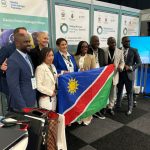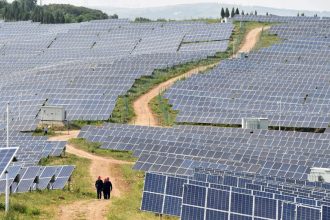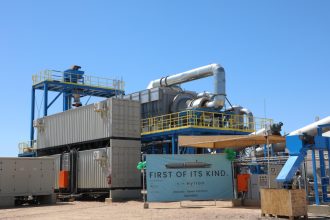SILVY DIERGAARDT
The Swapo Government, under President Netumbo Netumbo-Nandi Ndaitwah, is pushing for Namibia to add value to its uranium locally and a nuclear power plant could be one such way to do so.
During a recent visit to the Rössing Uranium Mine, President Nandi-Ndaitwah said: “Nuclear energy is essential and the government will put in effort to make sure the environment is conducive for the mining sector to flourish.”
Under the Swapo Manifesto Implementation Plan, and within the Key Economic Enablers for Energy, a need has been identified to conduct a feasibility study to explore the development of a nuclear energy plant. A timeline of June 2026 has been attached to this development.
The Swapo manifesto stipulates the need to: “Train and develop professionals in the nuclear field as the foundation for Nuclear power generation to realise the production of medical isotopes, food production, and energy supply.”
During the NamPower tariff announcement by the Electricity Control Board, the CEO Robert Kahimise said the ECB was looking into the feasibility of creating a nuclear power plant to supply baseload energy of Namibia.
“From where we are, it (nuclear) does qualify to be dispatched as a baseload power plant. We can only advise the government on the advantages of nuclear power as we seek a sustainable supply of electricity,” said Kahimise.
Expert Opinions
Experts have weighed in on the possibility of nuclear production in Namibia.
Dr Gabi Schneider, the Executive Director of the Namibian Uranium Institute (NUI), said Namibia lacks skills needed to launch the production of nuclear energy.
Furthermore, she said the country’s current electricity grid network will have to be updated to suit the size of the nuclear plant to be built.
Namibia will also need to have the necessary agreements with the International Atomic Energy Agency (IAEA) in place.
“Namibia’s uranium, which is currently exported as uranium oxide, needs to be manufactured into a fuel format that can be loaded into a nuclear reactor and therefore, agreements with converters, enrichers and fuel manufacturers need to be in place,” said Dr Schneider.
South African energy expert, Chris Yelland, also weighed in on the possibility of Namibia developing a nuclear power plant.
“The demand for electricity in Namibia is really too low to justify a major investment in a large scale nuclear power. There are no immediate opportunities available for Namibia,” he said.
However, Yelland said there is a possibility for small scale modular reactors in the country, albeit a long way to be commercially available yet. Namibia is also exploring forming partnerships with countries that have pioneered nuclear power plants. The Russian government recently sent a high-level delegation to Namibia led by Deputy Prime Minister, Yuri Trutnev. Namibia has called upon Russia to collaborate on the local processing of Uranium.






